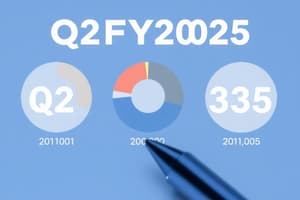Podcast
Questions and Answers
What is the method of permanent finance that limited companies can use to purchase necessary assets?
What is the method of permanent finance that limited companies can use to purchase necessary assets?
Share capital/ equity capital
How can limited companies sell shares up to a limit of their authorised capital?
How can limited companies sell shares up to a limit of their authorised capital?
By the means of a public issue by prospectus or a rights issue
What type of share provides a fixed percentage dividend?
What type of share provides a fixed percentage dividend?
Preference shares
What type of share represents risk capital or equity?
What type of share represents risk capital or equity?
What are debentures?
What are debentures?
How long is the repayment period for debentures?
How long is the repayment period for debentures?
What is the characteristic of bank loans in terms of interest payments?
What is the characteristic of bank loans in terms of interest payments?
What type of interest rates can bank loans have?
What type of interest rates can bank loans have?
What is the purpose of a business mortgage?
What is the purpose of a business mortgage?
Who are venture capital providers?
Who are venture capital providers?
Flashcards are hidden until you start studying
Study Notes
Why Businesses Need Finance
- Businesses need finance for various reasons, including:
- Start-up capital to purchase essential equipment or premises
- Working capital for day-to-day operations, such as paying bills and building inventory
- Growth and expansion, including buying new assets and paying for higher working capital needs
- Research and development to create new products
- External growth through acquiring other businesses
- Paying off debts, including loans and other forms of debt
- Marketing and promotion to attract customers and increase sales
Short-Term and Long-Term Finance
- Short-term finance is needed for a short period (up to one year) to meet immediate financial needs
- Long-term finance is needed for a longer period (more than one year) for investments like buying buildings or equipment
Profit and Cash
- Profit is the value of goods sold (revenue) minus costs
- Cash is the money that flows in or out of a business over a given time period
- Cash flow is critical, as lack of finance is a common cause of business failure
Managing Working Capital
- Managing working capital involves managing inventory, accounts payable, and accounts receivable
- Key factors to consider include the cash conversion cycle and days inventory outstanding
Capital Expenditure and Revenue Expenditure
- Capital expenditure is long-term spending on non-current assets (e.g., buildings, land, and equipment)
- Revenue expenditure is short-term, day-to-day spending on assets other than non-current assets (e.g., wages, insurance)
Sources of Finance for Limited Companies
- Internal sources: retained profits, reduction of working capital, sale of unwanted assets, and sale and leaseback of non-current assets
- External sources: debt financing (e.g., share capital, debentures, bank loans, business mortgage, venture capital, and government grants) and equity financing (e.g., share capital, hire purchase, leasing, and medium-term loans)
Internal Sources of Finance
- Retained earnings: profit left after all additions and deductions from sales revenue, kept for future use rather than being spent on dividends
- Sale of unwanted assets: selling unnecessary assets to raise finance for more profitable ventures
- Share capital/equity capital: a method of permanent finance for limited companies, issuing shares to purchase necessary assets
Studying That Suits You
Use AI to generate personalized quizzes and flashcards to suit your learning preferences.




